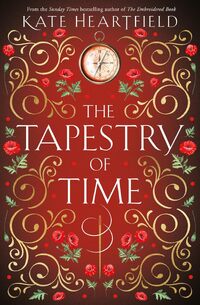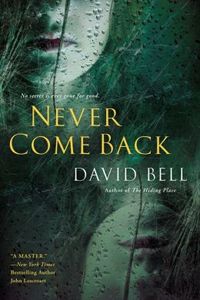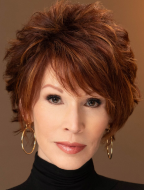 THE TAPESTRY OF TIME |
 Sunshine, secrets, and swoon-worthy stories—June's featured reads are your perfect summer escape. |

Purchase
NAL Suspense Excerpt of Never Come Back by David BellChapter One I saw people in uniform first--two cops, two paramedics. They were standing in the living room of my mom's small house, their thumbs hooked into their belts, muttering to one another. Small talk and jokes. One of them, a cop about my age, laughed about something, then looked up and saw me in the doorway. "Ma'am?" he said. A question. It meant: Do you have any business here? The other cop nodded. He understood who I was and what I was doing there. "Are you . . . ?" he said. "I'm Elizabeth Hampton," I said. "This is my mother's house." "Of course," the second cop said. He held up his index finger. "Just one moment." "My mom," I said. "I got a call from a detective. He said--" I didn't feel well. My body felt liquid and loose, as if my joints were made of rubber and water. Everything shook. I was scared. I leaned against the doorjamb, trying not to collapse. The cop left, went down the hallway toward the bedrooms. One of the paramedics, a thick, barrel-chested guy, his arms bulging against his short sleeves, came over and steadied me. "Here," he said. "Sit down." I didn't move of my own volition. He moved me. Gently. And then I was sitting on the familiar couch, the one my mother had owned for close to fifteen years, more than half my life. "Is that better?" the paramedic said. "A detective called," I said. "He said my mom . . . He said there was a problem, and I needed to get over here right away." "Just sit back," the paramedic said. "Is she okay?" "The police will talk to you." But I knew. I knew. They didn't call you to the scene. They didn't stand around talking--laughing even. They didn't do those things unless there was nothing else to do. Unless someone was dead. I said the words to myself: Mom is dead. I looked around the small, familiar living room. I grew up in that house, lived there until I was eighteen and left Ohio for college. Everything was neat and orderly as always. Vacuumed and dusted. No clutter on the entertainment center. It never changed. Next to Mom's chair sat one book of her crossword puzzles, a pen, reading glasses. Next to the chair a shelf with family pictures. My dad when he was alive. A wedding photo of the two of them, looking both nervous and happy. Also a photo of me and my brother. "Shit," I said. "My brother. Ronnie. Is he here? He must be here." "He's fine," the paramedic said. "He's in his room with one of the officers." "Is he okay?" "He's doing fine." A man and a woman emerged from the hallway. The man was middle-aged, almost bald, fit, and quite tall. He wore a suit coat over a polo shirt, and his movements seemed nervous and imprecise. His head turned from side to side, checking out everything in the room, the people and the objects. He was birdlike, an intelligent but edgy bird. The woman looked young, not much older than me. She was black with a short afro. She wore pants and a button-down lavender shirt. She wasn't very tall, and even though she walked with confidence, she stayed a pace behind the man and let him do the talking. Next to him, she looked centered and calm. Even. "Are you Elizabeth Hampton?" the man asked. He didn't meet my eye. When he spoke, his hands moved through the air, turning over and over as though trying to crank something to life. "Yes. I want to know what happened to my mother." "I'm Detective Richland," the man said. "This is Detective Post." He made a gesture that pointed somewhere in the direction of his partner. "I'm the one who called you earlier." "Is my mother dead?" I asked. "When's the last time you spoke to her?" Richland asked. He seemed more focused when he asked me that question. His eyes landed and held on mine for a moment. "Is she dead?" I asked. I heard the edge in my voice, the sharpness. I reached for that tone with my students when I needed to. I doubted it would work with cops, but I tried anyway. "I just want to know what happened and why I've been called here. Is my mother dead?" Richland took a moment to answer. Then he nodded his head. "I'm sorry for your loss," he said. His words sounded practiced and routine. Did he stand in front of a mirror and run through them? But I'd known all along. Even still, hearing the words from a stranger brought it home. A gasp escaped from my mouth, an exhalation of disbelief. I felt as if I were sinking into the couch. I stared at the floor, then at those glasses next to her chair. The glasses, such a simple object, so representative of her, suddenly seemed unmoored and cut off from the rest of the world. They looked like an artifact from another time. She was gone. Mom is dead. "Can I get you some water, Ms. Hampton?" Post asked. I couldn't answer. I didn't say anything. I kept staring at the glasses, then the photo of my dad. He was gone. She was gone. She's gone. Like magic, Post was at my side, handing me a glass of water, one of Mom's familiar, dated orange glasses. I took a long gulp. It helped. I gulped some more, then took two deep breaths. Richland moved closer to me. He stood over me, his head almost reaching the ceiling. He must have been close to six feet eight inches tall. Could a cop be that size and still do his job? "I'm sorry, Ms. Hampton," he said. "But we need to ask you some questions." He still sounded robotic. Programmed. "Did she have a stroke?" I asked. "She had high blood pressure, but she always took her medicine." "When is the last time you talked to her?" Richland asked again. I held my water glass tight. I sensed Richland's anticipation. An easy enough question, but I couldn't answer it. I stumbled over my words. "I don't . . . I'm not sure . . . it's been . . ." "How long?" Richland asked, his voice flat. "Just a rough guess." "I guess . . ." I took another sip. "We had an argument." I looked up at the two detectives, hoping for sympathy, maybe even a reprieve from the questions. They both looked back at me, impassive, endlessly patient. "It's probably been about . . . six weeks," I said. Their faces remained the same, but Richland asked, "Six weeks since you've seen your mother?" His hands fluttered. "Or six weeks since you've talked to her?" "Both," I said. "And you live here in Dover, right?" Post asked. I liked her better. She seemed calming, encouraging. She seemed to understand that my mother had just died. "Yes, I do. I grew up here. Then I came back last year to go to graduate school." "You go to Dalton U?" Post asked. "Here in town?" "Yes. I'm studying history." "I went there too," Post said. She looked at Richland. "We both did, didn't we, Ted?" There was a pause. He ignored her attempt to make a connection, or else he just didn't pick up on her cue. Richland then asked, "Do you mind explaining the nature of this argument you had with your mother?" "Why are you asking me these questions?" I asked. "You say my mother is dead. She's sixty-nine years old. She lived like a monk. She didn't go anywhere. She didn't do anything except take care of my brother. Why are you saying these things? What happened to her?" Richland and Post exchanged looks then. Something unspoken passed between them, and Richland nodded, as though giving his approval to a task they needed to do. He looked at me again. His eyes settled on mine and didn't waver. It made me think all of it--the fluttering hands, the nervous gestures--was some kind of act, something to keep the people he spoke to off balance. Because his voice sounded steady and sure as he delivered the next piece of news to me. "We're treating your mother's death as a possible homicide," he said. "That's why we need to ask you these questions." The glass slipped out of my hand and hit the carpet with a dull thunk. Chapter Two "The paramedics who responded to the 911 call noticed some irregular bruising on your mother's body." Richland continued to speak in a flat, even tone, as though he were telling me what the weather was like or relaying the score of an unimportant sporting event. His hands fluttered less. "They contacted us to perform a preliminary investigation." His words flew past me like flung rubber bands. Post came in from the kitchen with a paper towel and dabbed at the water by my feet. "I can clean that up," I said. "It's fine," Post said. "You've had a shock." "What kind of bruises?" I asked. "Was she beat up? Did someone beat her to death?" "I really can't talk about that--" "She's an older woman. A mom. Who would hurt her like that?" "We haven't confirmed a cause of death yet," Post said. "We're not even sure it's a homicide." "Homicide," I said. The word sounded offensive to my ears, brutal and nasty. I wasn't ready to associate it with my mother. "It's early still," Richland said. "Give us time to sort things out." He did something with his mouth. His lips moved, and some of his teeth showed. I think he was trying to smile at me. "Let's all be patient." "I want to see my brother," I said. "I need to see him, to make sure he's okay." Post stood up, the limp towel in her hand. Richland nodded, the smile-thing still on his face. "He's in his room." "And I want to see Mom. I want to see her before they take her away." "I'll take you to your brother," Richland said. He waited for me to stand up. Detective Richland led me to the door of Ronnie's bedroom and stepped aside. But before he did, he said, "We're going to have to do some additional processing of the house. We started before you arrived, but we have some more to do." "Processing?" I asked. "Photographs of the scene. Fingerprints." "Okay," I said, although I wasn't sure what I was even referring to. Ronnie was twenty-seven, just one year older than me. He was a high-functioning adult with Down syndrome. Before I went in there, I looked to the end of the hall, to my mother's bedroom. I saw the back of someone wearing a Harris County Medical Examiner Windbreaker. I couldn't see anything else. Ronnie kept his room immaculate with a militarylike efficiency. His bed was always made, his clothes and things always put away and out of sight. Part of this came from my mother and her lifelong quest for order and cleanliness in her house, but part of it came from Ronnie's dedication to routine, his determination to master any task handed to him. He controlled his living space. It was his entirely. Ronnie sat on the side of the made bed, his hands folded in his lap. Down syndrome kept him shorter than me--only about five foot three--and he possessed the characteristic short neck and flattened facial features common to those who have the condition. He also had the dark brown hair and dark brown eyes that could only have come from our father, who Ronnie resembled a great deal. He looked up when he saw me, his face expectant. "Oh, Ronnie," I said. He didn't move from his spot until I sat down next to him on the bed. Then he let me fold him into my arms. He pressed his face into my neck, and I pulled him tight. "Mom's gone," he said. "I know." We sat like that for a long time. Then he said, "They won't tell me anything. They won't tell me what went wrong." "Me either." Ronnie could hold a conversation with just about anybody, despite having a slight impairment that forced him to wear hearing aids in both ears. He worked a part-time job at a local store, bagging groceries and stocking shelves. He managed to get himself there every day by riding the bus or walking when the weather was nice. But he still lived with Mom, which was more her choice than his. She protected him--hovered over him, really. I knew her death would hit him harder than I could imagine. He didn't like disruptions to his routine. He didn't respond well to emergencies or sudden changes. I had no idea what would come of him. I waited as long as I could before I asked another question. "What happened, Ronnie?" I said. "Did she collapse? Did she say anything?" He didn't answer. "It's okay if you don't want to talk about it yet." "I found her on the floor in her room," he said. "She was unconscious?" "I wasn't home," he said. "I came home and she was on the floor." I looked at the large digital clock next to Ronnie's bed. Ten forty-five p.m. The police had called me about twenty minutes earlier, which meant-- "You weren't home? Where were you? Were you at work?" He sat up and shook his head. He used his thick fingers to reach into his pants pocket and draw out a neatly folded handkerchief. He wiped his nose and eyes. "I was at Mrs. Morgan's house." Mrs. Morgan was the elderly--very elderly--widow who lived two doors down. She sometimes "watched" Ronnie when Mom had things to do, although Ronnie was perfectly capable of being left on his own for long stretches of time. "Why were you there?" I asked. "Did Mom go somewhere?" Ronnie shrugged, still holding the handkerchief. "I don't know. She told me to go to Mrs. Morgan's house around six o'clock. She didn't call for me, and Mrs. Morgan fell asleep. So I walked home . . ." His voice trailed off. "And you came in and found Mom?" He nodded. "I called 911 like I was supposed to. I did it right away." "Of course," I said. "You did the right thing." Before I could dwell too long on the horror my brother must have felt when he found our mom unresponsive on the floor, Detective Post stepped into the doorway of Ronnie's room. "Ms. Hampton?" she said. "Could I speak with you?" I looked at Ronnie. He seemed withdrawn. Sad. "Sure," I said. I hugged Ronnie, pulling him close to me again. His body felt stiff under my embrace. I let him go and stood up. I followed Post into the hallway, and again my eyes tracked to Mom's bedroom. Someone had closed the door. "We're ready to remove your mother's body from the house," Detective Post said. "I wondered if maybe you wanted to close the door to your brother's room or take him out of the house while we do it." "I want to see her before you take her away." Post pursed her lips. "Are you sure about that?" "Is she damaged in some way?" I asked. "I thought you said she wasn't beaten." "There are bruises, but they're not consistent with a beating," Post said. "It's just . . . it can be upsetting." She looked me in the eye and I didn't waver. "But if you want to, I think you should." The detective walked down the hallway to the door of Mom's bedroom and knocked lightly. She looked back at me. "Would you like me to sit with your brother?" "He's fine," I said. "He's not a child." Someone opened the door of Mom's room, and Post stuck her head in. She said something, then stepped back, leaving the door open. "Okay," she said. "They're finished in there. You can go on in." Excerpt from Never Come Back by David Bell |
|
| |||
|
||||




 © 2003-2025
© 2003-2025